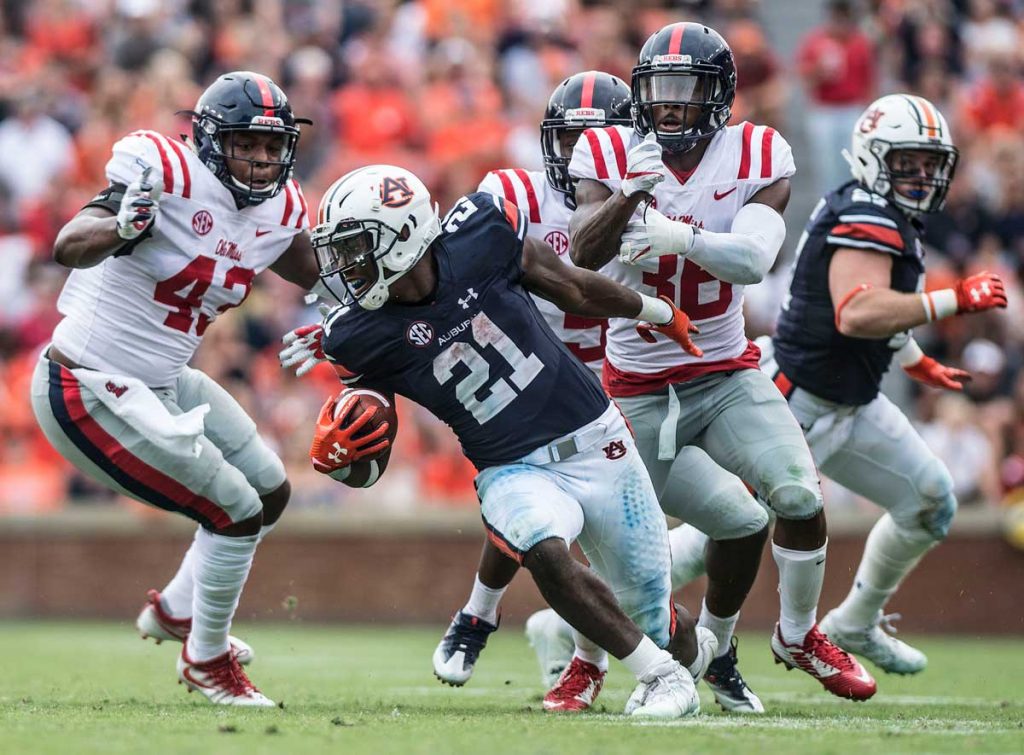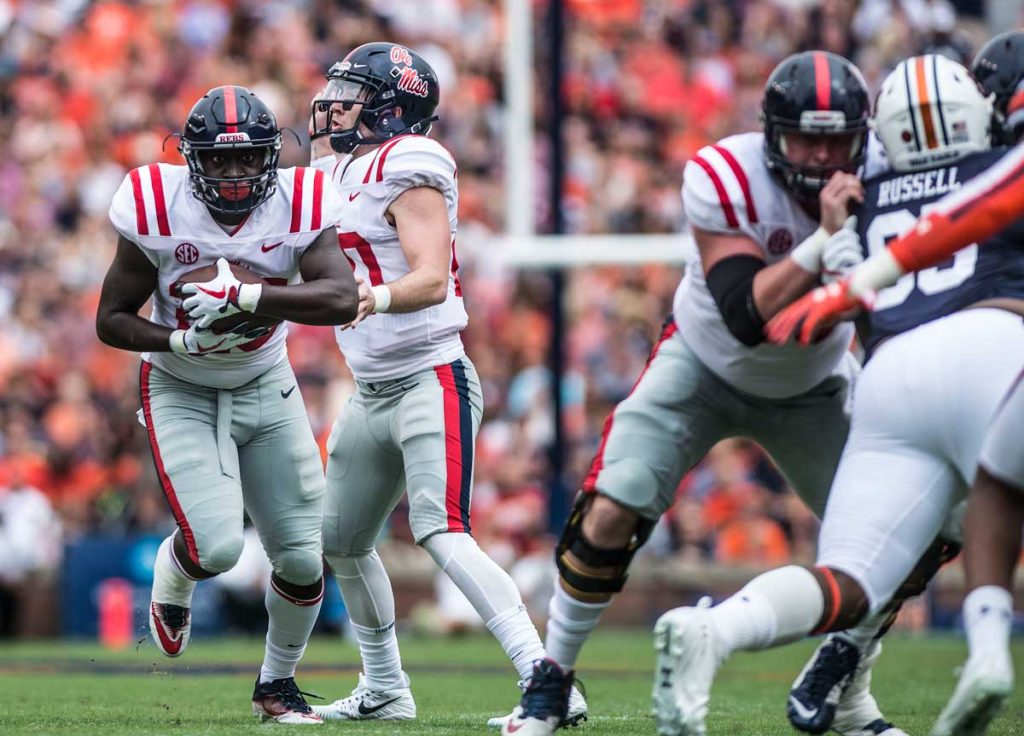The Rebels cannot catch a break in the state of Alabama. Following its 66-3 loss to the Crimson Tide, Ole Miss traveled back to the Yellowhammer State for a Saturday morning matchup with Auburn. In a game that ultimately finished 44-23 in favor of the Tigers, Auburn’s strengths and Ole Miss’ weaknesses were on full display for the 86,700 fans inside Jordan-Hare Stadium.
The Rebels’ inability to finish drives in the red zone dominated much of the opening action. The offense moved the ball efficiently until it was deep in Auburn territory, forced to settle for field goal attempts, one of which was missed. The run game continued to struggle, but the passing game was working. Patterson completed 10 of 15 passes in the first quarter for 110 yards. With no help from the run game, the Rebels could not convert yards into points.

Auburn running back Kerryon Johnson rushes downfield before being tackled by Rebels defensive back Zedrick Woods during the second half of the game Saturday. Johnson scored three touchdowns for Auburn’s 44-23 win. Photo by Ariel Cobbert
While the Rebels were struggling to put points on the board, the Tigers were converting possessions into touchdowns. Kerryon Johnson and the Auburn offensive line had their way with the Ole Miss defense. The running backs for the Tigers were getting through the front seven of the Rebels with ease, leaving it to the secondary to make tackles (which it did not do). Head coach Gus Malzahn’s offense flourished and gained 391 yards of Auburn offense in the first half alone. Defensive coordinator Wesley McGriff said he thinks the early struggles were the same things that have plagued the Rebel defense all year.
“We were inconsistent,” McGriff said. “Guys were missing (assignments) and making mental errors. It was our mistakes, (and) they capitalized.”
In the second half, the Rebels ended a touchdown drought that started in the second quarter of the game against Cal. D.K. Metcalf scored on a 9-yard catch, finally converting a good drive. Metcalf added a second score, and Jordan Wilkins added a 1-yard touchdown run. All three of the touchdowns happened inside the 10-yard line. The passing game produced 346 yards, with the backs gaining 83 yards on the ground. Offensive coordinator Phil Longo noted the red zone performance as the big difference between the first and second half.
“We were moving the ball and had our tempo going,” Longo said. “The goal when you get inside the 25-yard line is to get seven. Coach challenged them to fight at halftime, and they did. The second half (today) could be the turning point of our season.”
The defense also showed life in the second half, forcing three-and-outs in the Tigers’ first two offensive possessions. As the game continued, Rebel defenders were missing fewer tackles and forcing Auburn into long-yardage third downs. Between the stops on defense and the ease for Patterson and the offense, it was apparent two different Ole Miss teams had shown up in Auburn.
“There were no schematic changes (in the second half),” Luke said. “I told them I wanted the second half. I want to see a difference. I want this to be the turning point of our season.”

D’Vaughn Pennamon carries the ball downfield after Shea Patterson’s handoff during the 44-23 defeat against Auburn on Saturday. Photo by Ariel Cobbert
Right when the Rebels were on the verge of duplicating last week’s performance, the players and coaches shut it down. A change in attitude led to the defense getting off the field and the offense putting up points. In what was ultimately a forgettable game, Luke and his staff will have positives to build on going forward.
Defensive back Zedrick Woods credited the turnaround to mental adjustments.
“We came out unfocused,” Woods said. “(The problems) were not X’s and O’s.”
The Rebels return home for the first time in more than a month to take on Vanderbilt in next Saturday’s homecoming game. Coach Matt Luke views the game against the Commodores, coupled with Saturday’s second half, as an opportunity to get the season back on track.
“It is big,” Luke said, regarding playing at home. “Playing at Vaught-Hemingway is one of the best home-field advantages in the country. Rebel nation needs to come together.”






